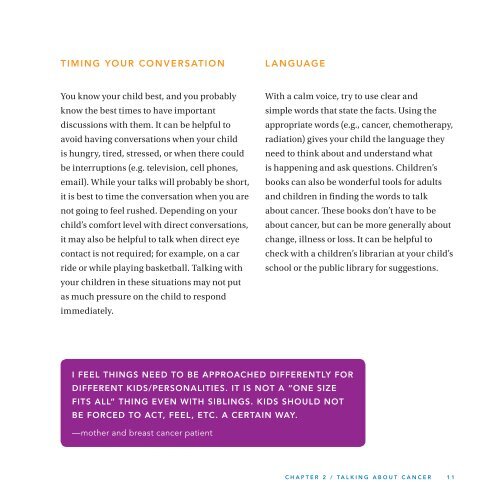Frankly-Speaking-About-Cancer-What-Do-I-Tell-the-Kids
Frankly-Speaking-About-Cancer-What-Do-I-Tell-the-Kids
Frankly-Speaking-About-Cancer-What-Do-I-Tell-the-Kids
Create successful ePaper yourself
Turn your PDF publications into a flip-book with our unique Google optimized e-Paper software.
TIMING YOUR CONVERSATION<br />
LANGUAGE<br />
You know your child best, and you probably<br />
know <strong>the</strong> best times to have important<br />
discussions with <strong>the</strong>m. It can be helpful to<br />
avoid having conversations when your child<br />
is hungry, tired, stressed, or when <strong>the</strong>re could<br />
be interruptions (e.g. television, cell phones,<br />
email). While your talks will probably be short,<br />
it is best to time <strong>the</strong> conversation when you are<br />
not going to feel rushed. Depending on your<br />
child’s comfort level with direct conversations,<br />
it may also be helpful to talk when direct eye<br />
contact is not required; for example, on a car<br />
ride or while playing basketball. Talking with<br />
your children in <strong>the</strong>se situations may not put<br />
as much pressure on <strong>the</strong> child to respond<br />
immediately.<br />
With a calm voice, try to use clear and<br />
simple words that state <strong>the</strong> facts. Using <strong>the</strong><br />
appropriate words (e.g., cancer, chemo<strong>the</strong>rapy,<br />
radiation) gives your child <strong>the</strong> language <strong>the</strong>y<br />
need to think about and understand what<br />
is happening and ask questions. Children’s<br />
books can also be wonderful tools for adults<br />
and children in finding <strong>the</strong> words to talk<br />
about cancer. These books don’t have to be<br />
about cancer, but can be more generally about<br />
change, illness or loss. It can be helpful to<br />
check with a children’s librarian at your child’s<br />
school or <strong>the</strong> public library for suggestions.<br />
I FEEL THINGS NEED TO BE APPROACHED DIFFERENTLY FOR<br />
DIFFERENT KIDS/PERSONALITIES. IT IS NOT A “ONE SIZE<br />
FITS ALL” THING EVEN WITH SIBLINGS. KIDS SHOULD NOT<br />
BE FORCED TO ACT, FEEL, ETC. A CERTAIN WAY.<br />
—mo<strong>the</strong>r and breast cancer patient<br />
CHAPTER 2 / TALKING ABOUT CANCER 11


